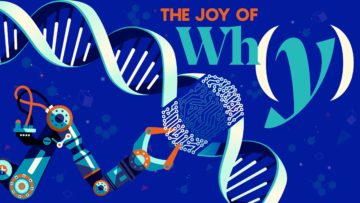From Quanta Magazine:
By genetically instructing cells to perform tasks that they wouldn’t in nature, synthetic biologists can learn deep secrets about how life works. Steven Strogatz discusses the potential of this young field with researcher Michael Elowitz.
 What is synthetic biology and what are scientists trying to do with it? Simply put, we could say that synthetic biology is a fusion of biology, especially molecular biology, and engineering. The distinctive thing about it is that it treats cells as programmable devices. It’s a kind of tinker toy approach that builds circuits, but not out of wires and switches like we’re used to, but rather out of biological components, like proteins and genes. Programming cells in this way isn’t really all that different from programming computers, except that the programming language isn’t Python, or C++. It’s the language of biology, the language of DNA, with the goal of making proteins that will interact with each other in some clever ways.
What is synthetic biology and what are scientists trying to do with it? Simply put, we could say that synthetic biology is a fusion of biology, especially molecular biology, and engineering. The distinctive thing about it is that it treats cells as programmable devices. It’s a kind of tinker toy approach that builds circuits, but not out of wires and switches like we’re used to, but rather out of biological components, like proteins and genes. Programming cells in this way isn’t really all that different from programming computers, except that the programming language isn’t Python, or C++. It’s the language of biology, the language of DNA, with the goal of making proteins that will interact with each other in some clever ways.
The potential medical applications of synthetic biology are huge. But also, the approach holds promise for illuminating how life works at the deepest level. It’s one thing to strip cells apart to see how they work. That’s the classic approach to molecular biology. But it’s another thing to tinker with cells to try to get them to perform new tricks, which is something that my guest, Michael Elowitz, does. For example, a while back, he engineered cells to blink on and off like Christmas lights.
More here.
